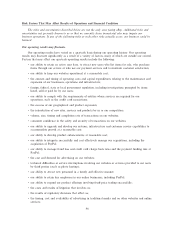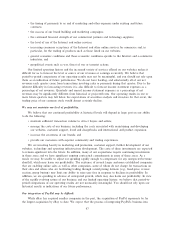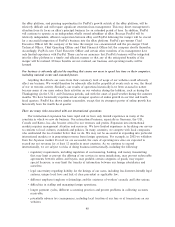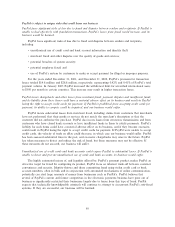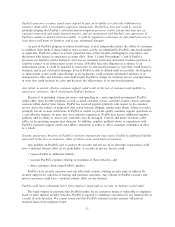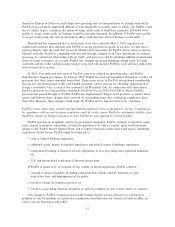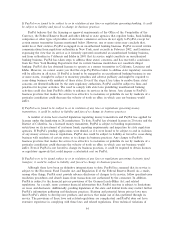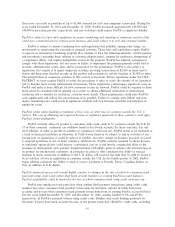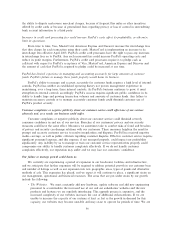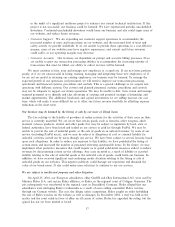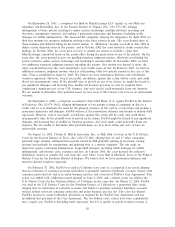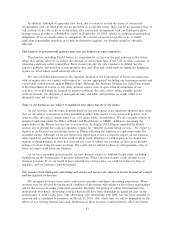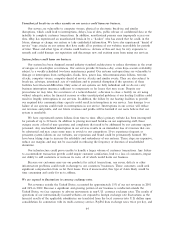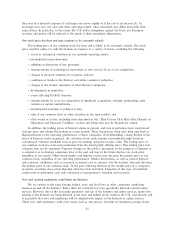eBay 2002 Annual Report Download - page 57
Download and view the complete annual report
Please find page 57 of the 2002 eBay annual report below. You can navigate through the pages in the report by either clicking on the pages listed below, or by using the keyword search tool below to find specific information within the annual report.these laws can result in penalties of up to $1,000 assessed for each non-compliant transaction. During the
years ended December 31, 2001 and December 31, 2002, PayPal processed approximately 189,000 and
348,000 transactions per day, respectively, and any violations could expose PayPal to signiÑcant liability.
PayPal is subject to laws and regulations on money laundering and reporting of suspicious activities that
could have a material adverse impact on its business and could subject it to civil and criminal liability.
PayPal is subject to money laundering laws and regulations that prohibit, among other things, its
involvement in transferring the proceeds of criminal activities. These laws and regulations require PayPal
to operate an anti-money laundering program that contains at least the following elements: written policies
and procedures (including those relating to customer identiÑcation), training for employees, designation of
a compliance oÇcer, and regular independent review of the program. PayPal has adopted a program to
comply with these regulations, but any errors or failure to implement the program properly could lead to
lawsuits, administrative action, Ñnes and/or prosecution by the government. PayPal is also subject to
regulations that require it to report suspicious activities involving transactions of $2,000 or more and to
obtain and keep more detailed records on the senders and recipients in certain transfers of $3,000 or more.
The interpretation of suspicious activities in this context is uncertain. Future regulations under the USA
PATRIOT Act may require PayPal to revise the procedures it takes to verify the identity of its customers
and to monitor more closely international transactions. These regulations could impose signiÑcant costs on
PayPal and make it more diÇcult for new customers to join its network. PayPal could be required to learn
more about its customers before opening an account, to obtain additional veriÑcation of international
customers and to monitor its customers' activities more closely. These requirements could raise PayPal's
costs signiÑcantly and reduce the attractiveness of its product. Failure to comply with federal and state
money laundering laws could result in signiÑcant criminal and civil lawsuits, penalties and forfeiture of
signiÑcant assets.
PayPal's status under banking or Ñnancial services laws or other laws in countries outside the U.S. is
unclear. The cost of obtaining any required licenses or regulatory approvals in these countries could aÅect
PayPal's future proÑtability.
PayPal currently oÅers its product to customers with credit cards in 37 countries outside the U.S. In
19 of these countries, customers can withdraw funds to local bank accounts. In these countries, it is not
clear whether, in order to provide its product in compliance with local law, PayPal needs to be regulated as
a bank or Ñnancial institution or otherwise. If PayPal were found to be subject to and in violation of any
foreign laws or regulations, it could be subject to liability, forced to change its business practices or forced
to suspend operations in one or more countries. Alternatively, PayPal could be required to obtain licenses
or regulatory approvals that could impose a substantial cost on it and involve considerable delay to the
provision or development of its product. Implementation of PayPal's plans to enhance the attractiveness of
its product for international customers, in particular its plans to oÅer customers the ability to transact
business in major currencies in addition to the U.S. dollar, will increase the risks that it could be found to
be in violation of laws or regulations in countries outside the U.S. In the fourth quarter of 2002, PayPal
began oÅering customers the ability to send or receive payments in Pounds, Euros, Canadian Dollars or
Yen, in addition to U.S. dollars.
PayPal's Ñnancial success will remain highly sensitive to changes in the rate at which its customers fund
payments using credit cards rather than bank account transfers or existing PayPal account balances.
PayPal's proÑtability could be harmed if the rate at which customers fund using credit cards goes up.
PayPal pays signiÑcant transaction fees when senders fund payment transactions using credit cards,
nominal fees when customers fund payment transactions by electronic transfer of funds from bank
accounts and no fees when customers fund payment transactions from an existing PayPal account balance.
For the years ended December 31, 2001 and December 31, 2002, senders funded 51.5% and 49.8%,
respectively, of PayPal's payment volume using credit cards. Senders may resist funding payments by
electronic transfer from bank accounts because of the greater protection oÅered by credit cards, including
55



